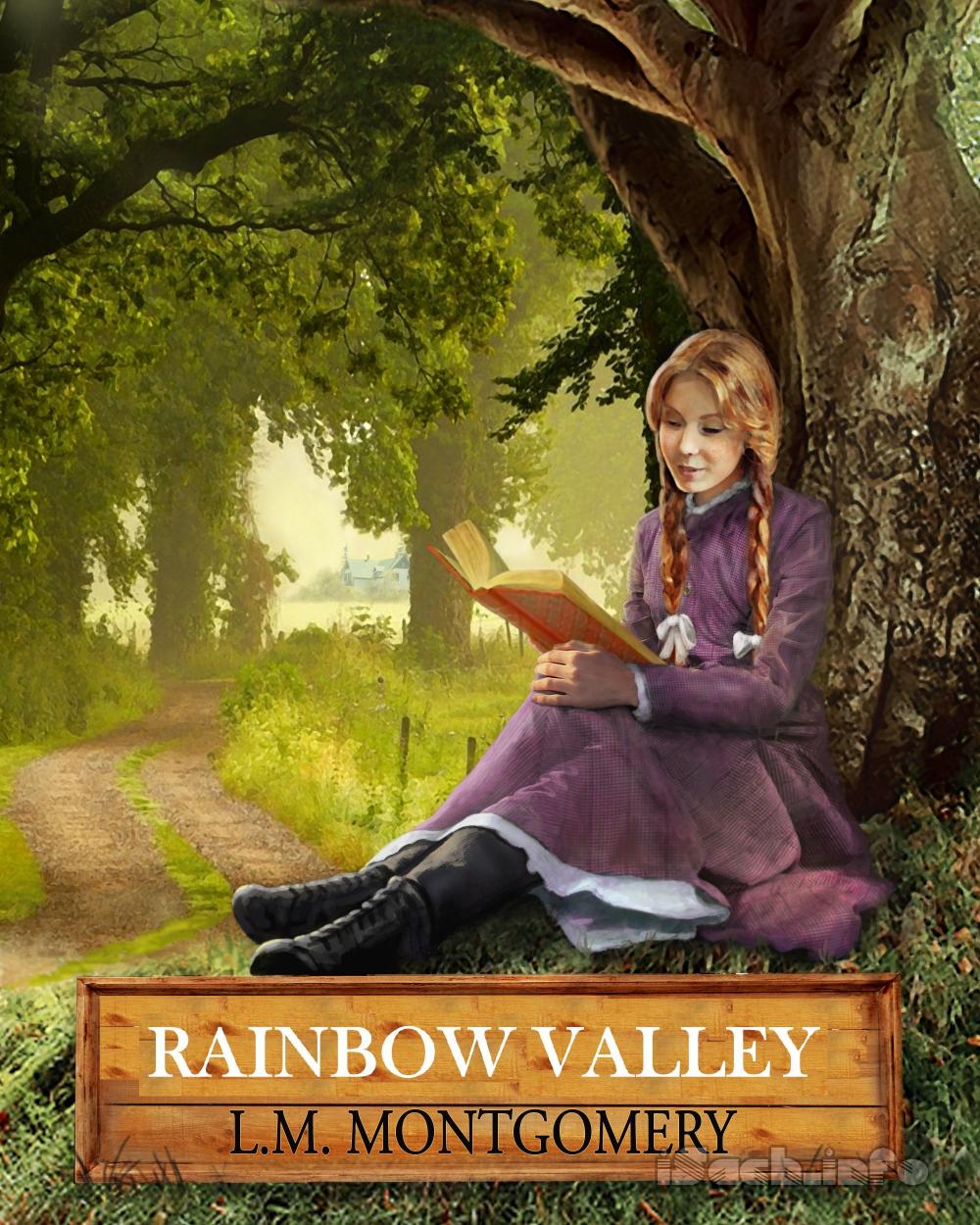Chapter 22: St. George Knows All About It
A
t midnight Ellen West was walking home from the Pollock silver wedding. She had stayed a little while after the other guests had gone, to help the gray-haired bride wash the dishes. The distance between the two houses was not far and the road good, so that Ellen was enjoying the walk back home in the moonlight.The evening had been a pleasant one. Ellen, who had not been to a party for years, found it very pleasant. All the guests had been members of her old set and there was no intrusive youth to spoil the flavour, for the only son of the bride and groom was far away at college and could not be present. Norman Douglas had been there and they had met socially for the first time in years, though she had seen him once or twice in church that winter. Not the least sentiment was awakened in Ellen's heart by their meeting. She was accustomed to wonder, when she thought about it at all, how she could ever have fancied him or felt so badly over his sudden marriage. But she had rather liked meeting him again. She had forgotten how bracing and stimulating he could be. No gathering was ever stagnant when Norman Douglas was present. Everybody had been surprised when Norman came. It was well known he never went anywhere. The Pollocks had invited him because he had been one of the original guests, but they never thought he would come. He had taken his second cousin, Amy Annetta Douglas, out to supper and seemed rather attentive to her. But Ellen sat across the table from him and had a spirited argument with him—an argument during which all his shouting and banter could not fluster her and in which she came off best, flooring Norman so composedly and so completely that he was silent for ten minutes. At the end of which time he had muttered in his ruddy beard—"spunky as ever—spunky as ever"—and began to hector Amy Annetta, who giggled foolishly over his sallies where Ellen would have retorted bitingly.
Ellen thought these things over as she walked home, tasting them with reminiscent relish. The moonlit air sparkled with frost. The snow crisped under her feet. Below her lay the Glen with the white harbour beyond. There was a light in the manse study. So John Meredith had gone home. Had he asked Rosemary to marry him? And after what fashion had she made her refusal known? Ellen felt that she would never know this, though she was quite curious. She was sure Rosemary would never tell her anything about it and she would not dare to ask. She must just be content with the fact of the refusal. After all, that was the only thing that really mattered.
"I hope he'll have sense enough to come back once in a while and be friendly," she said to herself. She disliked so much to be alone that thinking aloud was one of her devices for circumventing unwelcome solitude. "It's awful never to have a man-body with some brains to talk to once in a while. And like as not he'll never come near the house again. There's Norman Douglas, too—I like that man, and I'd like to have a good rousing argument with him now and then. But he'd never dare come up for fear people would think he was courting me again—for fear I'D think it, too, most likely—though he's more a stranger to me now than John Meredith. It seems like a dream that we could ever have been beaus. But there it is—there's only two men in the Glen I'd ever want to talk to—and what with gossip and this wretched love-making business it's not likely I'll ever see either of them again. I could," said Ellen, addressing the unmoved stars with a spiteful emphasis, "I could have made a better world myself."
She paused at her gate with a sudden vague feeling of alarm. There was still a light in the living-room and to and fro across the window-shades went the shadow of a woman walking restlessly up and down. What was Rosemary doing up at this hour of the night? And why was she striding about like a lunatic?
Ellen went softly in. As she opened the hall door Rosemary came out of the room. She was flushed and breathless. An atmosphere of stress and passion hung about her like a garment.
"Why aren't you in bed, Rosemary?" demanded Ellen.
"Come in here," said Rosemary intensely. "I want to tell you something."
Ellen composedly removed her wraps and overshoes, and followed her sister into the warm, fire-lighted room. She stood with her hand on the table and waited. She was looking very handsome herself, in her own grim, black-browed style. The new black velvet dress, with its train and V-neck, which she had made purposely for the party, became her stately, massive figure. She wore coiled around her neck the rich heavy necklace of amber beads which was a family heirloom. Her walk in the frosty air had stung her cheeks into a glowing scarlet. But her steel-blue eyes were as icy and unyielding as the sky of the winter night. She stood waiting in a silence which Rosemary could break only by a convulsive effort.
"Ellen, Mr. Meredith was here this evening."
"Yes?"
"And—and—he asked me to marry him."
"So I expected. Of course, you refused him?"
"No."
"Rosemary." Ellen clenched her hands and took an involuntary step forward. "Do you mean to tell me that you accepted him?"
"No—no."
Ellen recovered her self-command.
"What DID you do then?"
"I—I asked him to give me a few days to think it over."
"I hardly see why that was necessary," said Ellen, coldly contemptuous, "when there is only the one answer you can make him."
Rosemary held out her hands beseechingly.
"Ellen," she said desperately, "I love John Meredith—I want to be his wife. Will you set me free from that promise?"
"No," said Ellen, merciless, because she was sick from fear.
"Ellen—Ellen—"
"Listen," interrupted Ellen. "I did not ask you for that promise. You offered it."
"I know—I know. But I did not think then that I could ever care for anyone again."
"You offered it," went on Ellen unmovably. "You promised it over our mother's Bible. It was more than a promise—it was an oath. Now you want to break it."
"I only asked you to set me free from it, Ellen."
"I will not do it. A promise is a promise in my eyes. I will not do it. Break your promise—be forsworn if you will—but it shall not be with any assent of mine."
"You are very hard on me, Ellen."
"Hard on you! And what of me? Have you ever given a thought to what my loneliness would be here if you left me? I could not bear it—I would go crazy. I CANNOT live alone. Haven't I been a good sister to you? Have I ever opposed any wish of yours? Haven't I indulged you in everything?"
"Yes—yes."
"Then why do you want to leave me for this man whom you hadn't seen a year ago?"
"I love him, Ellen."
"Love! You talk like a school miss instead of a middle-aged woman. He doesn't love you. He wants a housekeeper and a governess. You don't love him. You want to be 'Mrs.'—you are one of those weak-minded women who think it's a disgrace to be ranked as an old maid. That's all there is to it."
Rosemary quivered. Ellen could not, or would not, understand. There was no use arguing with her.
"So you won't release me, Ellen?"
"No, I won't. And I won't talk of it again. You promised and you've got to keep your word. That's all. Go to bed. Look at the time! You're all romantic and worked up. To-morrow you'll be more sensible. At any rate, don't let me hear any more of this nonsense. Go."
Rosemary went without another word, pale and spiritless. Ellen walked stormily about the room for a few minutes, then paused before the chair where St. George had been calmly sleeping through the whole evening. A reluctant smile overspread her dark face. There had been only one time in her life—the time of her mother's death—when Ellen had not been able to temper tragedy with comedy. Even in that long ago bitterness, when Norman Douglas had, after a fashion, jilted her, she had laughed at herself quite as often as she had cried.
"I expect there'll be some sulking, St. George. Yes, Saint, I expect we are in for a few unpleasant foggy days. Well, we'll weather them through, George. We've dealt with foolish children before, Saint. Rosemary'll sulk a while—and then she'll get over it—and all will be as before, George. She promised—and she's got to keep her promise. And that's the last word on the subject I'll say to you or her or anyone, Saint."
But Ellen lay savagely awake till morning.
There was no sulking, however. Rosemary was pale and quiet the next day, but beyond that Ellen could detect no difference in her. Certainly, she seemed to bear Ellen no grudge. It was stormy, so no mention was made of going to church. In the afternoon Rosemary shut herself in her room and wrote a note to John Meredith. She could not trust herself to say "no" in person. She felt quite sure that if he suspected she was saying "no" reluctantly he would not take it for an answer, and she could not face pleading or entreaty. She must make him think she cared nothing at all for him and she could do that only by letter. She wrote him the stiffest, coolest little refusal imaginable. It was barely courteous; it certainly left no loophole of hope for the boldest lover—and John Meredith was anything but that. He shrank into himself, hurt and mortified, when he read Rosemary's letter next day in his dusty study. But under his mortification a dreadful realization presently made itself felt. He had thought he did not love Rosemary as deeply as he had loved Cecilia. Now, when he had lost her, he knew that he did. She was everything to him—everything! And he must put her out of his life completely. Even friendship was impossible now. Life stretched before him in intolerable dreariness. He must go on—there was his work—his children—but the heart had gone out of him. He sat alone all that evening in his dark, cold, comfortless study with his head bowed on his hands. Up on the hill Rosemary had a headache and went early to bed, while Ellen remarked to St. George, purring his disdain of foolish humankind, who did not know that a soft cushion was the only thing that really mattered,
"What would women do if headaches had never been invented, St. George? But never mind, Saint. We'll just wink the other eye for a few weeks. I admit I don't feel comfortable myself, George. I feel as if I had drowned a kitten. But she promised, Saint—and she was the one to offer it, George. Bismillah!"



 ePub
ePub A4
A4